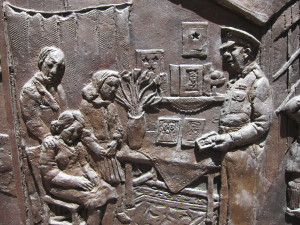
The link between the treatment of immigrants in the United States and the relationship between the U.S. government and their home countries is well-documented by historians. Doubters need look no farther than the entrance to the federal courthouse in downtown San Jose and the memorial to Japanese-Americans imprisoned during World War II by the U.S. government after Japan bombed Pearl Harbor. Relations between the U.S. government and the Chinese government have deteriorated in recent months. (Photo by S. Simonson)
By Sharon Simonson
SAN JOSE — A federal magistrate judge has agreed to reopen a detention hearing for a U.S.-educated Chinese citizen arrested May 16 in Los Angeles on accusations of trade-secret theft involving two semiconductor companies with Silicon Valley ties.
Los Angeles U.S. Magistrate Judge Alicia G. Rosenberg in a May 18 decision had ordered Hao Zhang confined to a U.S. corrections facility prior to trial, an unusual and extreme measure in American jurisprudence. In explaining her decision, the judge cited a serious risk that the defendant would flee, his lack of U.S. ties, the nature of the alleged offenses and his status as a citizen and resident of China. Zhang is 36-years-old.
The order to reopen the detention hearing, dated May 29 and issued by San Jose U.S. Magistrate Judge Nathanael Cousins, did not explain the basis of the decision.

Federal agents arrested Zhang at the Los Angeles International Airport upon his re-entry into the United States from the People’s Republic of China, acting on an April 2 arrest warrant issued by the U.S. District Court in San Jose. The arrest warrant followed a grand jury indictment returned April 1 of Zhang and five other Chinese citizens. The San Jose court sealed both the indictment and arrest warrant until after Zhang was detained.
While the indictment and related court records have now been made public, some documents in the case remain sealed.
Zhang has not yet entered a plea in the case, according to the court records. His attorneys did not respond to email requests from SiliconValleyOneWorld.com for comment. The court record thus far contains only documents filed by the U.S. government. A status hearing in the case, before San Jose U.S. District Court Judge Edward Davila, has been set for June 15.
The 30-page, 32-count indictment details the defendants’ actions beginning in the early 2000s and extending to March 2013. It incorporates a 10-page timeline, gleaned almost entirely from defendants’ email communications in which they appear to openly discuss the thefts.
Hao Zhang and Wei Pang, who was also indicted, are both full professors at China’s Tianjin University. Tianjin University is a leading PRC Ministry of Education University and one of the oldest universities in China, according to the U.S. government.
Pang worked for Avago Technologies Ltd. in Fort Collins, Colo., until the end of June 2009. Hao Zhang worked for Skyworks Solutions Inc. in Massachusetts until May 2009. Huisui Zhang, who was also indicted, worked for Micrel Semiconductor in San Jose.

Avago is headquartered in San Jose and Singapore. Skyworks is based in Massachusetts but has offices in Santa Clara.
The indictment says that defendants Hao Zhang, Pang and Huisui Zhang attended Los Angeles’ University of Southern California to earn advanced electrical engineering degrees. All three began their studies in the early 2000s and completed them in 2006.
Neither the indictment nor the other court records disclose the immigration or visa status of the three men while at USC, during their tenures at their respective companies, or now.
Abraham Simmons, a spokesperson for the U.S. Attorney’s office, said in an email response to a query on the topic: “… (T)here is no public information in the record with which I can respond substantively…” A spokeswoman for U.S. Immigration and Customs Enforcement said retrieving the correct records from their database could be ensured with a date of birth for the defendants. Simmons did not respond to a request for that information, and it does not appear in the court record.
Not quite 80 percent of foreign students studying in the United States do so using an F-1 visa, and USC is the heaviest user of F-1 visas in the country, admitting not quite 14,000 F-1 students from 2008 to 2012, according to the Brookings Institution. USC has not quite 42,000 students, roughly half undergraduate and half graduate. USC did not respond to a request for information.
Unlike the H-1B work visa, the federal government puts no cap on the number of F-1 visas it issues. Their use has fluctuated in the last 15 years based on political and economic events. As of 2012—the latest year for which Brookings has statistics—524,000 foreign students were studying at U.S. universities and colleges using F-1 visas. That was a nearly 400 percent increase over the count in 2001.
Students from China make up 25 percent of foreign students in the United States, the largest single bloc. Students from India make up 15 percent, the next largest, Brookings reports.
The F-1 program came under scrutiny after the 1993 World Trade Center bombing and again after Sept. 11, 2001, when it was revealed that foreign citizens involved in both incidents had been admitted to the United States on the F-1 student visa, according to Brookings.
While at USC, Pang and Zhang conducted research and development on “thin-film bulk acoustic resonator,” or FBAR, technology under funding from the U.S. Defense Advanced Research Projects Agency, better known as DARPA, according to the U.S. Department of Justice. Avago and Skyworks later hired both to be FBAR engineers. In 2008, officials from Tianjin University traveled to San Jose to meet with Zhang, Pang and others, according to federal prosecutors and the Federal Bureau of Investigation. “Shortly thereafter, Tianjin University agreed to support Zhang, Pang and others in building an FBAR manufacturing plant in China,” prosecutors said.
Zhang’s arrest is but one of several incidents in recent weeks involving allegations by the U.S. government of criminal wrongdoing against Chinese citizens and the Chinese government. In another case related to securing an F-1 visa, a federal grand jury in Pittsburgh, Penn., indicted 15 Chinese nationals on May 21, alleging their involvement in a scheme to defraud the testing services used by U.S. universities to determine student admissions, including foreign students.
(Photos by Sharon Simonson)